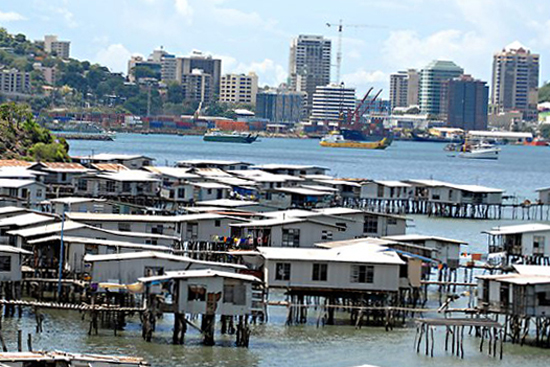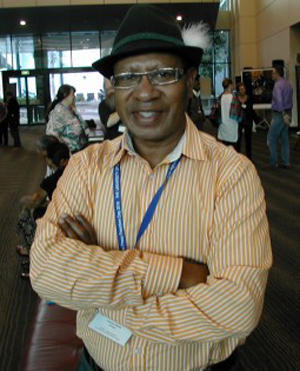
Papua New Guinea is on the cusp of an extraordinary economic, social and political transition – one the country has not seen since gaining independence from Australia in 1975. Where this change will take it remains utterly uncertain. But that it is undergoing a convulsion is clear. Rowan Callick reports.
ANALYSIS: Papua New Guinea’s founding father and Prime Minister Sir Michael Somare, aged 75 next month, was found guilty last Monday of 13 charges of misconduct and on Thursday was suspended from office for 14 days.
Until recently, this would have caused a sensation that would have virtually stopped the nation.
That it hasn’t demonstrates how rapidly PNG has changed. It is awash with cash, and corruption. It is wired everywhere, mobiles hanging off every ear, in a way unthinkable under the old government telecommunications corporation.
And its population is already larger than New Zealand’s and heading to overtake Australia this century.
The Leadership Tribunal, chaired by Australian judge Roger Gyles, found Somare guilty of filing incomplete or late returns on his assets and business dealings to the Ombudsman Commission annually as required.
It is Somare’s skills as a leader and a player for 42 years in the PNG political game, which is at once ornate and brutal, that have held together his ruling coalition for almost 10 years.
But this long-anticipated court case has become more a coda to the passing of the old independence era than a decisive central movement of a fresh symphony.
On the cusp
For regardless of Somare’s personal fate, PNG is on the cusp of an extraordinary economic, social and political transition – one the country has not seen since gaining independence from Australia in 1975.
Where this change will take it remains utterly uncertain. But that it is undergoing a convulsion is clear.
A new generation is on the move, born since independence and unburdened by sentiment towards the past.
The election due mid next year, for which the manoeuvring is well under way, will indicate who is likely to win or lose from this transition. Usually, more than half the MPs lose their seats, and this time Somare has said he may decide to stand down at last, clearing the way for generational change.
Within 30 years, PNG’s population may start to overtake that of Australia as it stands today. Its capital Port Moresby is already approaching one million and appears set to be bigger thanAuckland and Brisbane before long.
Its economy is likely to grow faster than China’s this year, more than 8 percent. Almost every leading resource company in the world is scrabbling over prospects there.
Rio Tinto is back after the Bougainville civil war. BHP Billiton is back after the debacle of its withdrawal from Ok Tedi. The first liquefied natural gas project, costing $16.5 billion, is just beginning four frenetic years of construction in the Southern Highlands and along a pipeline route down to the liquefaction plant in Port Moresby.
Massive mines
Massive mines are being developed elsewhere.
Port Moresby’s burgeoning backstreet lodges are bursting with landowners from gas fields and mine sites desperately seeking their fortunes from government and corporations, from anyone who may be persuaded to compensate them amply for their lost lands.
And life is being transformed especially rapidly by the wild rush into the mobile phone era.
Irish-based company Digicel, which specialises in telecommunications for developing countries, has launched a remarkably cheap service and backed it up by building towers all over PNG, giving its signals a nationwide reach despite its mountainous interior and myriad islands.
Streetside betel nut sellers and people offering single cigarettes for 25c now also sell SIM cards.
In bustling Tabari Place in Boroko in the capital, traders have set up booths where they sell mobiles and all the associated paraphernalia, the deals usually being conducted entirely in Tok Pisin, while in the background young preachers try to attract the attention of the milling crowds.
Downtown outside the US embassy, where security guards hold dogs on leashes and parking is restricted to diplomatic staff, people wander the pavements selling China-pirated DVDs of American movies for $4 a time, as well as memory cards and flash drives.
Village phone talk
Papua New Guineans are able to contact relatives back in their villages by phone for the first time. The arrival of 3G has enabled people to go online throughout the country, accelerating the attractions of Facebook, which has already attracted 35,000 users.
Groups of young social and environmental activists — such as Act Now, Patriots, and The Voice, are building their numbers rapidly via such new technology, and also propelled by a growing rejection of the old politics of PNG: the parliamentary numbers game and the domination of money politics.
A “consultancy” firm run by one lobbyist from Enga province in the Highlands, the populous, high-energy but sometimes unruly region that is coming to dominate much of the country’s business and politics, is named, with breathtaking frankness, Money Talks Ltd.
A massive hoarding at the start of the road to the parliament carries the unadorned biblical text of Proverbs 29:2: “When the righteous are in authority the people rejoice. But when the wicked rule, the people suffer.” Chronox Manek is among those sufferers. By rapid evasive action with his car, he only narrowly escaped an assassination attempt 15 months ago by gunmen outside his home but still requires treatment for his left arm where one of the bullets hit home.
Chronox Manek is among those sufferers. By rapid evasive action with his car, he only narrowly escaped an assassination attempt 15 months ago by gunmen outside his home but still requires treatment for his left arm where one of the bullets hit home.
He is the Chief Ombudsman, whose most contentious role is to police the Leadership Code that is the prime tool for combating corruption in PNG.
The foyer to the Ombudsman Commission’s office displays posters with cartoons. One shows a sleek politician urging a group of peers: “All those in favour of the construction of this hotel, say aye.” A thought bubble is emerging from his head at the same time: “On my block of land!”
Illegal ‘pay back’ bribes
Another has an Asian figure saying to an official: “I know you can’t accept a bribe. It’s illegal. But this is just a loan. Pay me back whenever you can.”
The stakes have never been higher in PNG, and thus the institutions established at independence by Australia have never been under such siege, especially the legal system.
Manek, who for many years was the top public prosecutor and has been the leading public defender, and has a master’s in law from the University of Melbourne, only pursues a limited number of targets at a time.
It is thus all the more extraordinary that the police have failed to make any charges over this assassination attempt on one of the country’s top constitutional office holders.
Manek says: “I’m left without information about what’s going on” over the case. “But it’s happened, and I’m moving on.”
He believes corruption began its insidious undermining of the country’s governance in the early 1980s, when PNG opened up to the logging industry.
“Our world was no longer an Australian-focused one but a much bigger world”, in this case, that of Asian timber corporations.
‘No sweat, no get’
Manek’s favourite motto is “no sweat, no get”.
He believes that has been undermined by a growing culture of taking short cuts to getting rich. And he is keen to educate the public that it is its right to insist that governments deliver citizens the services they are paying for.
“I want to educate the leadership that the public is right,” Manek says.
Another figure who is urging on this shift to a new form of leadership in PNG is Powes Parkop, a young former journalist, academic and human rights lawyer who is the Governor of Port Moresby.
He has gained a reputation for cleaning up the city and beautifying it, for new fountains, for Christmas lights, for his organising of family events in the evenings to “reclaim the night” from the rascal gangs, with some positive indications: young hoodlums being chased away from evening big-screen relaying of rugby league games.
“We need to change the political culture and quickly,” Parkop says. “It has gone bad in PNG and we must alter that so that many other changes can happen, too. Too many people have effectively been disenfranchised, socially and economically.
“People have migrated here to Moresby looking for the land of milk and honey, and have found instead a place that is not so rosy.”
Facebook businessmen
Sam Basil is another new-generation MP, a young businessman from Bulolo in Morobe province, scene of an early gold rush 80 years ago and where top global mining houses are building or planning to build world-sized mines.
Basil uses Facebook extensively in communicating his views, with his supporters and others.
He says he is concentrating much of his efforts on helping give the public accounts committee of the parliament the teeth it needs.
Paul Barker, executive director of the private-sector-funded Institute of National Affairs, says it’s crucial that the government ensures that benefits flow broadly from the new resource projects, especially from the ExxonMobil led gas deal.
“If the government doesn’t get its act together and leaders cream off the profits, then PNG will get only the downside, not the upside, from such projects,” he says. “As in the Arab world today, the people in their 30s are the talking generation. But the younger generation below them have no special respect for what’s happened before.”
Australia’s role as PNG enters this difficult transition remains substantially shaped by its aid program, which comprises about 14 per cent of the national budget. It is becoming more focused and more practical, advice giving way to implementation.
Last year AusAID built 400 classrooms, provided 500,000 textbooks and trained 9000 teachers. The aim is to raise this to 800,000 textbooks next year. They will be delivered via an international procurement agency, which is also being deployed for the health project that is following these education successes, aiming to distribute much-needed basic medicines to every aid post and clinic, however remote.
Alternative paths
Alternative paths towards PNG’s development are reflected in the Port Moresby landscape.
Structures new at independence in 1975, such as the “pineapple building” where prime ministers once had their offices and the former main government building nearby, have been abandoned for sheer want of maintenance, today decaying skeletons.
Nearby, Malaysian logging giant Rimbunan Hijau — “forever green” — has built a massive mall, the Vision Centre. It is still largely untenanted but is likely to fill steadily, including with a new cinema complex that will be Port Moresby’s first since its old cinemas were shut as crime soared.
There is an intensity in the humid air, a gathering pace of change, as individuals and the nation as a whole dices for the prosperous future that has so far evaded them.
Rowan Callick is the Asia-Pacific editor of The Australian. Republished with permission from the 26 March 2011 edition.



